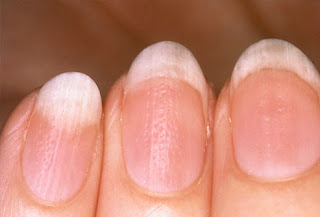Healthy nails indicates that we are in the PINK of health.
Physical beauty is defined by many factors, and one of the common criteria is neat and well-kept nears.
Our nails pay an important role in making an impression as their condition give subtle messages to about us. Poorly-groomed nails suggest that we are perhaps not very meticulous in our work.
Even if you’re donning a neatly pressed outfit, matching shoes and stylish bags, topped off with immaculate make-up, ugly nails can ruin your image, in the same way that brownish teeth of a habitual smoker does.
Unfortunately, we tend to neglect that our nails require daily care. As such, nails get uneven and dry cuticles and dirt accumulate, passing off the message that we’re dirty and untidy, regardless of how gorgeous our outfit can be.
Hence, many women and some men are turning to manicure and pedicure parlours to beautify their hands and feet, or purchasing DIY kits for trimming cuticles and applying nail polish. However, by directly exposing our nails to so many chemicals, our nails weaken over time, breaking, peeling or in the worst case scenario, to dropping off completely!
What exactly makes up a nail? Well, a nail is a hardened form of protein that protects the nail bed and enhances the sensibility of our fingertips.
Physical damage done to our nails through constant usage of nail polish or interaction with strong chemicals like washing detergents can lead to peeling of our nails. Chemicals like washing detergents, nail polish removers, nail polish and nail glue contain acetone that can dry out our nails, leaving them brittle.
More importantly, damaged, discoloured nails suggest heath problems. We must pay attention to our nails to ensure that we are in the pink of health.
WebMD has some very useful tips on what different appearances of our nails suggest about our body:
Pale nails
The flesh under our nails are by nature pinkish. Very pale nails may be a sign of illness, such as:
• Anaemia
• Congestive heart failure
• Liver disease
• Malnutrition
White nails
If nails are mostly white with darker rims, this can indicate liver problems, such as hepatitis. In this image, the fingers are also yellowish (jaundiced), another sign of liver trouble.
Yellow nails
One of the most common causes of yellow nails is a fungal infection. As the infection worsens, the nail bed may retract, and nails may thicken and crumble. In rare cases, yellow nails can indicate more serious conditions such as severe thyroid disease, lung disease, diabetes or psoriasis.
Bluish nails
Nails with a bluish tint can mean the body isn't getting enough oxygen. This could indicate an infection in the lungs, such as pneumonia. Some heart problems may be associated with bluish nails.
Rippled nails
If the nail surface is rippled or pitted, this may be an early sign of psoriasis or inflammatory arthritis. Discoloration of the nail is common; the skin under the nail can seem reddish-brown.
Cracked or split nails
Dry, brittle nails that frequently crack or split have been linked to thyroid disease. Cracking or splitting combined with a yellowish hue is more likely due to a fungal infection.
Puffy nail fold
If the skin around the nail appears red and puffy, this is known as inflammation of the nail fold. It may be the result of lupus or another connective tissue disorder. Infection can also cause redness and inflammation of the nail fold.
Dark lines beneath the nail
Dark lines beneath the nail should be investigated as soon as possible. They are sometimes caused by melanoma, the most dangerous type of skin cancer.
Gnawed nails
While you may think nothing about habitual nail biting, it could be a sign of persistent anxiety that could benefit from treatment. Nail biting and picking have also been linked to obsessive-compulsive disorder. If you can't stop, you should see a doctor.
Red / Black Nails
Red or black nails may be due to blood clot under the nail because of trauma, such as dropping something heavy on your toe or ingrown toe nails. To solve the ingrown toe nail problem, you should see a doctor. Red or black nails go away when they have grown out. If you do not experience pain or discomfort, in your toe, you can leave it alone.
Greenish nails
Green patches on nails are signs of fungal infection and are common among people whose fingers and toes come frequently into contact with water, such as homemakers and cleaners. This is because the Pseudomonas bacteria that causes this grows well under the nail plate due to moist conditions, and causes the infection.
Women who work most of the time with their hands and feet soaked in water and detergents are more likely to get infected with green nails.While it poses no immediate hazard, it can lead to swelling and pain, and damage to the nail. Fortunately, this isn't hard to get rid of. You can go to the pharmacy to get a precription in the form of creams and solutions to apply over it. A vinegar is also a commonly recommended home remedy for mild infections, which involves you soaking the infected nails in apple cider vinegar for a few minutes daily. However, if you see no improvement in your condition, do seek professional help.
Nail problems should not be ignored. Many people take to nail polish or manicures to cover up discoloured or cracked nails. This is wrong as you may worsen the problem with the chemicals. Remember, beauty comes from within too. Hiding the problem does not make it go away. See a doctor if you must to set it right.
Written By: Veronica Tay
Sources:
http://www.livestrong.com/peeling-fingernails/
http://skincare.about.com/od/skincarefaqs/f/PeelingNails.htm
http://dermatology.about.com/cs/nailanatomy/a/nailanatomy.htm



























